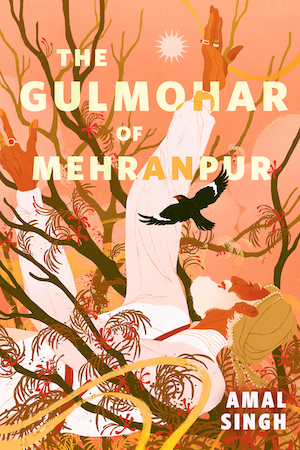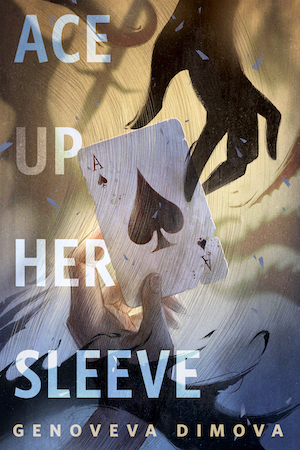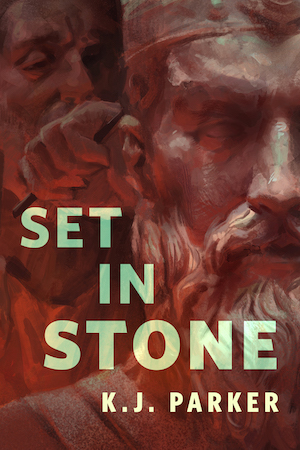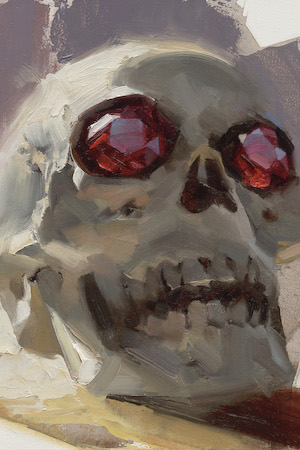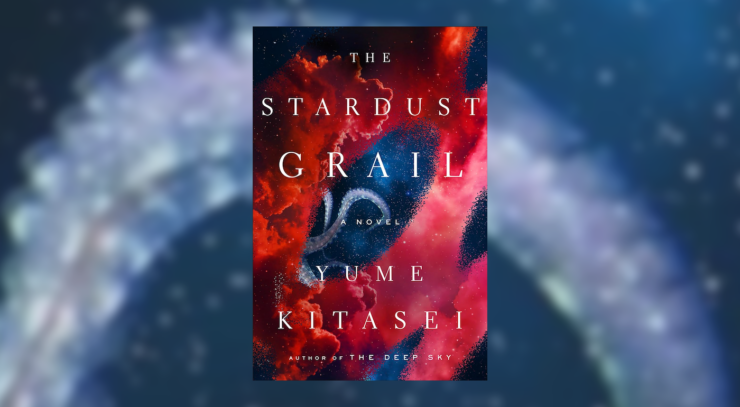We’re thrilled to share an excerpt from The Stardust Grail by Yume Kitasei, out from Flatiron Books on June 11th.
Maya Hoshimoto was once the best art thief in the galaxy. For ten years, she returned stolen artifacts to alien civilizations—until a disastrous job forced her into hiding. Now she just wants to enjoy a quiet life as a graduate student of anthropology, but she’s haunted by persistent and disturbing visions of the future.
Then an old friend comes to her with a job she can’t refuse: find a powerful object that could save an alien species from extinction. Except no one has seen it in living memory, and they aren’t the only ones hunting for it.
Maya sets out on a breakneck quest through a universe teeming with strange life and ancient ruins. But the farther she goes, the more her visions cast a dark shadow over her team of friends new and old. Someone will betray her along the way. Worse yet, in choosing to save one species, she may condemn humanity and Earth itself.
Chapter One
The largest private collection of rare artifacts from other worlds could be found in central New Jersey at Princeton University, and if anyone knew Maya Hoshimoto was a thief, they wouldn’t have let her anywhere near there.
Fortunately, no one did.
And anyway, she wasn’t a thief anymore, just a thirty-one-year-old graduate student entering her second year toward a PhD in comparative cultures—who happened to know a lot about foreign artifacts.
It was an excessively pretty end of summer in New Jersey, the kind where the birds were chirping and a few flowers hung drunk from their stems, but the air had just an edge of premonition to it. For Maya, who had grown up off-world under a dome, weather of any kind still felt like a gift.
Maya wandered into the sub-basement room of the Dr. Frank R. Humbert Alien Artifact Collection and Rare Books Archives where staff were unboxing recent acquisitions. Her friend, Pickle, one of the Assistant Archivists, looked up and grinned at her. “How do you always know when we’ve got a delivery? I didn’t even know you were capable of waking up before ten.”
“Obituaries,” Maya said, then realized that maybe this wasn’t the kind of thing a graduate student paid attention to: that the greatgrandson of a famous explorer, Dr. Nkosi, had died in his bathtub a month ago. She added: “I saw the van outside.”
Most material ended up sitting in storage for a couple decades, but the Nkosi Foundation had dropped a hefty monetary donation to ensure that these items were given priority treatment.
Maya watched them remove artifacts from the boxes onto two long tables lined with black velvet. Her studies included an internship with the archives, which had a special relationship with the Department.
And while the pay was ridiculously low, she enjoyed hanging out here. She was friends with most of the staff, and every once in a while, they came across something truly special, something that might, just maybe, unlock a constellation of discovery.
Buy the Book
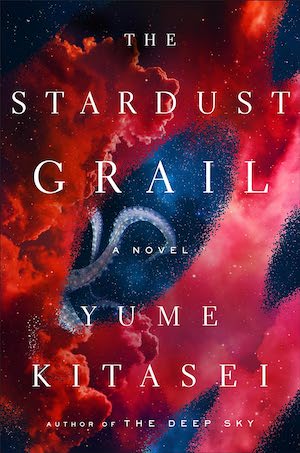

The Stardust Grail
“Quite a personal collection,” said one of the other grad students.
Maya raised an eyebrow. What she saw so far was disappointing: counterfeits and other common items. She reached for a round stone object etched with wavy lines.
“According to the inventory notes, those are worth more than your yearly paycheck,” said Pickle.
“Really? I know I don’t get paid much, but these are just personal hygiene products from current era,” said Maya. She lifted it closer to her nose and inhaled a complicated scent, almost like chocolate with a burnt undertone. Fashionable right now on certain Belzoar worlds. “Even accounting for the cost of interstellar shipping.”
The others stared at her.
“What else we get?”
“This one’s a thousand-year-old Frenro sculpture.” The other grad student offered a peek.
“Mmmm.” Maya reached for the snarl of metal and stone. It reminded her of an old friend and a ship and all the ever-changing stars she’d left behind to be here.
“Careful!” said Pickle.
“This one’s fake too. And I’m always careful.” She lifted it higher, so its polished facets caught the light, and examined the smooth surface.
“Bullshit,” sputtered Brian, a conservator for the Artifacts Division. “It’s been authenticated. It’s one of the most valuable pieces of his collection.”
Maya probed one of the metal bits, ignoring his protests. “These types of Frenro sculptures are like a memory box of places a Frenro has lived, hence the mixed media.”
“Yeah, and?”
“This piece here is—” She scanned it again with her ocular lenses. “Quartz.”
“So?”
“Quartz that appears to contain a significant amount of nitrogen,” Maya said. “Nitrogen in high concentration is poisonous to Frenro.”
“Oh my god. So true,” laughed Pickle.
“And this fragment here”—Maya pointed out a black shard—“is a settler-manufactured data chip, the kind we used to make.” During the war, she meant, but didn’t say. She remembered her parents assembling the tiny parts that went into them every night at the kitchen table. Best to avoid mentioning it in mixed company.
Brian came to examine it.
Maya would have liked to linger over the rest of the items, but there was a blinking in her lenses indicating an incoming call from her lead academic adviser, and it unfortunately could not be ignored.
Chapter Two
Her old, silver Planet 9 bomber jacket barely kept out the chill of the stacks she’d retreated to for privacy. No need for anyone else to witness her humiliation.
The sub-basement was a solid 18 degrees Celsius, dry, and dimly lit, to keep mold and deterioration at bay. The south side of the floor held the metal shelves full of as yet untouched artifacts and the long tables where they’d been unpacking the Nkosi shipment. The north side boasted rare volumes and correspondence—Pickle’s domain. There were rarely many people around.
She slipped into the expandable-meter gap between the shelves and slouched against the cold metal frame. The gloom was bearable, except it reminded her too much of the banged-up, dusty orange world she called home.
She removed a chunky camera ring from her pinky and balanced it on the lip of a shelf, then touched her earlobe.
Dr. Liam Waterson’s head materialized above a row of mint condition, crimson-bound minutes from some conference on interstellar relations.
His face was puffy and pale under a shock of red hair, except for a flush that blotched his cheeks and neck. Scowling, as usual. For as long as Maya had known him, he was irritated or anxious or both, and there was something comforting about his consistency.
“What is this?” he asked, without preamble.
So he had read the paper.
He’d called a week ago and asked her to send over what she’d been working on this summer for Xenology, a premier scientific journal. Liam wanted her to get a head start on accruing publication credits— important if she wanted a future in academia. Extra important if she planned on focusing entirely on museum studies rather than fieldwork.
Except she hadn’t been working on the paper. She had spent the last two months hiking and attempting to catalog every flavor of ice cream in New Jersey. Which left the only acceptable option of somehow condensing what should have been several months of research into seventy-two hours and appending a description of a concert she’d once attended while high on otherworldly psychedelics. Still, considering it was closer than Liam had ever been to another world, she thought it a fine enough contribution to the field. Fine enough-ish.
Maybe the detail about people vomiting acid on the carved stone floor and getting stuck when her soles began to melt was a little too much.
“It’s just a rough draft. To give you the general idea.”
“This isn’t a research paper. It’s a personal essay.” Maya may have grown up speaking Settlement Japanese, but her English was fine, and still Liam enunciated every consonant like he wasn’t certain she understood. “You can’t submit this. I gave you an extremely detailed outline, and you’ve driven over it backwards and forwards with a truck. How have you not made more progress? The deadline for submission is in three days.”
She decided to try for flattery first. “I figured as the foremost human expert on Belzoar culture you’d appreciate the unique set of firsthand observations.”
“Thank you for reminding me at every opportunity of all your ‘field’ experience,” snapped Liam. It was a sore subject. He might be an expert, but he had never left Earth due to a serious fear of flight, rooted in some wealthy childhood trauma involving a private plane. Despite this, his research techniques were excellent, and he was (Maya hated to admit) brilliant, which was how he had managed to develop cutting-edge theories without leaving New Jersey.
“No, sorry, I didn’t mean that. Look, all we have to do is sprinkle in a little data and, like, charts, and this will be another award-winning—”
“What data? What charts?” Liam’s voice jumped an octave. “And I told you to stop referencing your precious mystical grail in any papers. This was supposed to be a paper about Belzoar music. Which your grail has nothing to do with even theoretically. And even if it did—I’m telling you, no serious scholars write about it.”
“That’s why it’s fresh!” Maya attempted a smile.
“It’s a myth,” he growled.
Maya crossed her arms. “It’s real. Frenro have seen it with their own eyes. Er, visual receptors.”
“Like when? A thousand years ago? Everyone knows Frenro don’t have the best memory,” said Liam.
At this point, Maya could have pointed out that only one of them had met a Frenro, let alone operated an LLC with one, but she decided accepting the lecture was the quickest route to ending the conversation. Her committee of three advisers was already down to two after a disagreement over an interpretation of Belzoar courtship practices that she maintained was problematic—the interpretation, not the practices. Her advisers were now only Liam and Dr. Barnes, a professor who had been “on the verge of retirement” for fifteen years and was happy for Maya to do whatever she wanted. If Liam dropped her too, the Department would likely ask her to leave.
Liam scrubbed a hand through his beard. “This is a fucking nightmare. Like actually, this is the manifestation of a recurring nightmare I have.” At least he was transitioning from anger to anxiety, so that was good. “I just—I don’t know what to say. I’ve been trying to give you a chance, but you don’t make it easy. It’s like you don’t care. Why did you even come back?”
“Because passion can be dangerous,” she could have said, “and I’m too old to keep chasing ghosts.” But she said nothing, because when she said nothing, Liam tended to keep going until he tired himself out. Maya ran a finger over a neat row of books. She inhaled the scent of paper and dust and that sweet-acrid chemical glue they used for reassembling ceramics.
She had first come to Princeton for graduate school ten years ago. She and Liam had started in the same cohort. But Maya had taken a leave of absence in her first year to explore an existential crisis, and Liam had gone on to graduate and publish a book that was not only suitable for a mainstream audience but a bestseller. Now Maya was starting over, and Liam was a prodigiously young, tenured professor at their alma mater.
His husband, Quintin, was an old friend of Maya’s. Small galaxy, academia. That was, in fact, how Maya and Liam had reconnected when Maya decided to come back to Earth and give academia a second try.
Maya had been good at school once. She’d graduated with high honors from undergrad back in the day. And she did have impressive field experience. Last October, newly returned to Earth, she’d helped Liam publish a journal article that got stellar reviews. She even enjoyed life at the university when she wasn’t drowning: the way a conversation at two in the morning could crack open your mind, the discoveries you might find combing through archive materials no one else had bothered to unbox, the possibility that you might be able to contribute something to the universe without anyone getting hurt.
But lately, every time she sat down to work, she seemed to get distracted. She’d survived her first year with a brutal slog that had been helpful for pushing away all other thoughts. But then summer had come, and since she’d eschewed the fieldwork route that most of the other students took, she’d been left knocking about campus.
“…There are only so many ways I can dodge the Chair asking about your performance metrics.” The Chair of the Department already held it against Maya that she hadn’t done fieldwork the past summer. Maya wrinkled her nose. She liked to fantasize about a time when academia wasn’t about raw numbers—articles published, conferences attended, colleagues “supported,” awards won, and grants pulled in. But she supposed if there was one thing people were good at, ivory tower or no, it was cramming themselves into some sort of grind.
She’d been so proud when she was admitted ten years ago, the first settler from PeaceLove to attend an Earth university, and one of the famous old ones at that. Her mother had cried, and her father had been insufferable. But then it was miserable. She’d come back, because she thought it would be different now that she was older, more mature, wiser, and smarter, with nothing to prove. But also, she didn’t know what else to do.
“Send me a new draft by noon tomorrow,” Liam was saying. “We need to get you back on track or…” He leaned ominously into the conjunction.
“That bad?” Maya asked. She was joking, but not really. She didn’t want to know the answer, because deep down (not that deep), she was as vain as the next person. She adjusted the books before her so they formed a precise, red line.
Liam shook his head. “We want you to reconsider fieldwork.”
Maya’s finger jerked one of the soft leather volumes out of formation. She didn’t mean to leave Earth anytime soon if she could help it, even if missing space sometimes felt like having the refrain of a favorite song rattling around in her head without being able to hear it for real. “You never did any fieldwork.”
“Well, you’re not me!” snapped Liam. “And you don’t exactly love the museum stuff.”
Fair. She struggled with the quietude. It left too much space for guilt and grief to sneak in the window in the early morning so she couldn’t bring herself to get out of bed. She’d come here for a fresh start, and yet she could barely drag herself to lectures.
“What about that fieldwork proposal you put together a while back? I talked to Professor Muhammad, and he’d still take you.”
“That was under duress. I’m not spending a semester in the Belzoar Nodal Region,” said Maya.
“The Chair wants to put you on probation. You haven’t just been struggling, your work has been bad, and it’s offensive, because I know you know this, and you’re capable of doing better, so really you’re just wasting my time. I don’t have the bandwidth to save you from yourself. I can’t spend all my time propping you up, you know. I have other responsibilities. My own problems. So, this afternoon, five p.m. Come by, and we’ll go through it. And follow the outline this time.”
He cut the connection before Maya was able to retort: “I don’t like your new mustache, so I guess we both have issues with how the other one spent the summer.” For the best.
She put her head down on a cart of unshelved materials. The sudden silence pressed inward. She tried to imagine she was out there in the black, enfolded by a blanket of starlight. No, even with her eyes closed she could feel everything around her; she was drowning in the excess of matter.
Liam was always direct and often rude, but rarely this harsh. And what made the lecture worse was that he wasn’t wrong. Therapy had helped, but she just didn’t fit here, never had. Lone settler woman among all the rich and privileged Earth-born students. But she wasn’t one to give up.
She needed to find Pickle.
Excerpted from The Stardust Grail. Copyright © 2024 by Yume Kitasei. Excerpted by permission of Flatiron Books, a division of Macmillan Publishers. No part of this excerpt may be reproduced or reprinted without permission in writing from the publisher.


